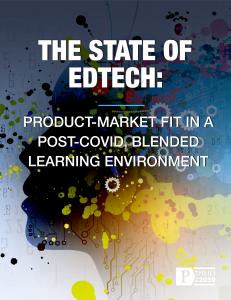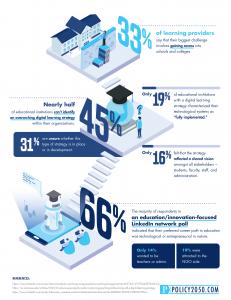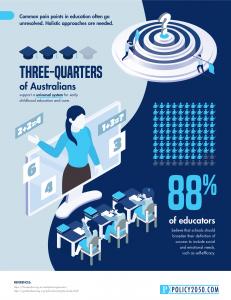Blended Learning Takes Center Stage: Navigating the New Norm
A New Report from Policy2050.com Investigates EdTech’s Alignment with Modern Learning Needs
SAN FRANCISCO, CALIFORNIA, USA, September 7, 2023/EINPresswire.com/ -- Policy2050, a tech-focused research firm, released its second annual EdTech report: “The State of EdTech: Product-Market Fit in a Post-COVID, Blended Learning Environment.” The 100-page (28,000 words) thematic analysis represents the end result of extensive interviews with EdTech innovators from a range of tech startups, industry leaders, and educational institutions. It’s the follow-up to the 2022 report “Global EdTech Market: Thematic Analysis — Perspectives from Industry Leaders & VC.”
The new report explores strategic perspectives and best practices for achieving EdTech product-market fit, reeling from pandemic-induced changes, navigating controversial digital trends, and preparing for the future. It’s an invaluable guide for academic institutions evaluating EdTech procurement, best practices, and options. EdTech innovators and their investors are expected to look to the report for market research, competitive benchmarking, and tactics that ensure post-COVID product-market fit. Policymakers or NGOs seeking to improve or expand education may appreciate the report’s insights on workforce reskilling or upskilling programs.
INTERVIEWS WITH TOP EDTECH INNOVATORS
From innovative startup founders to those influencing the future directions of established tech firms and educational institutions, lengthy Zoom interviews were designed to capture the myriad ways in which EdTech is being developed and deployed.
The report’s Featured Experts include:
• Gaurav Bradoo, Head of Product and Portfolio, Logitech for Education
• Richard Boyd, Co-founder and Chairman of Ultisim, CEO of Tanjo AI
• Titan Gilroy, CEO, TITANS of CNC
• Michael Bodekaer Jensen, Founder and CEO, Labster
• Hengjie Wang, Co-founder and CEO, Kami
• Jeremy Brassington, Co-founder and CEO, Habitat Learn Group
• Suren Aloyan, Co-founder and CEO, PopUp School
• Tara Chklovski, Founder and CEO, Technovation
• Marcus Pedersen, Learning Technologist, University College London
• Dr. Spencer Taintor, Head of School, Saint Mark’s Episcopal School
The report also visualizes over 20 quantitative insights as infographics at the conclusion.
PERSISTENCE OF BLENDED LEARNING
Blended learning may become more commonplace post-pandemic, with Policy2050 polling indicating an ongoing interest among some learners in young adulthood.
In January 2022, Policy2050 used Google Surveys to poll U.S. respondents in the 18-24 age bracket, gauging their thoughts on the following question: “Would remote online learning be effective for high school and higher ed students long term?”
• 37.85% responded: “No, it hasn’t worked during the pandemic.”
• 35.98% responded: “Yes, if it’s a mix of remote and in-person.”
• 26.17% responded: “Yes, there should be a fully remote option.”
In October 2022, Policy2050 conducted a follow-up using Google Surveys, again polling the 18-24 age bracket of U.S. residents, this time with the question: “When the pandemic is fully over, how much of the education system should remain digital/online?”
• 45.44%, seemingly fed up with digital adaptations, indicated “None of it.”
• 23.08% indicated “Only some parts.”
• 14.65% indicated “About 50%.”
• 16.84% indicated “More than 50%.”
The rapid shift to online learning platforms underscored EdTech’s vital role in maintaining educational continuity during unprecedented disruption, enabling real-time and recorded instruction and providing essential educational resources in a wholly new format. However, this surge didn’t come without challenges, such as the digital divide.
Many of the subject-matter experts interviewed for the report predicted an increase in innovation, with new types of degrees emerging and a focus not just on information but different types of immersion. The difficulty of maintaining student engagement in fully remote settings was identified as one of the most significant restraints, which could also be a driver of the anticipated innovation. For educators, now is the time for reflection in order to discern effective platforms from ineffective ones, overcome “Zoom fatigue,” and adapt to students’ evolving demands.
As experts noted, an influx of new demographics may be magnetized by the affordability and flexibility that online learning offers. Furthermore, remote or hybrid approaches can accommodate global peer-to-peer connections while also serving as bridges between academia and industry, increasing the value of education, transcending geographical limitations, and perhaps helping with the engagement piece.
PRODUCT-MARKET FIT
In EdTech, product-market fit is essential because the stakeholders are diverse, their needs are varied, institutional practices exert gravity, and learning outcomes produce ripple effects. The bar is much higher than it is for other tech sectors. It’s not just about product-market fit but a vastly more important societal fit.
EdTech startups can benefit from soft funding, prototyping, and academic validation. (VC funding to education startups peaked in 2021.) Instead of overpromising when it comes to digital solutions, an easier, more fruitful process in bringing EdTech products and services to market involves highlighting the benefits of digitizing in specific areas that round out a holistic approach.
As much of the subject-matter expert commentary suggested, a key growth area, or paradigm shift, involves the need to prepare students for complex problem-solving and real-world issues. For instance, students must learn to weed out misinformation and disinformation in the dynamic digital environments overarching not only their educations but future professional and civic lives. Nurturing STEM skills earlier, through experiential learning at the community level, could help with climate change globally.
AI AS THE NEW CHANGE DRIVER
Ideally, in a synergistic approach, educators would continue to provide nuance, student-specific interventions, and broader context, while recently popularized large language models would help to develop students’ curiosity, personalize their learning process, and accelerate their academic contributions. Ultimately, ChatGPT might push the education system away from traditional testing and grading towards a primary mandate to instill the desire to learn and develop skills. Such an approach might build up a growth mindset as opposed to a pressurized atmosphere that drives budding young minds to try to find shortcuts, such as using ChatGPT to cheat. This trend of alternative assessments was already underway prior to ChatGPT. AI might accelerate or force it, akin to the pandemic’s role.
Policy2050 founder David Pring-Mill commented, “Paired correctly, AI can empower educators to offer a more tailored and engaging learning experience.”
ABOUT POLICY2050.COM
Through market research and memberships, Policy2050.com seeks to influence the future of tech policy and business strategy in order to bring about a sustainable, fair, and vibrant economy.
David Pring-Mill
Policy2050.com
david.pringmill@policy2050.com
Visit us on social media:
Twitter
LinkedIn
Legal Disclaimer:
EIN Presswire provides this news content "as is" without warranty of any kind. We do not accept any responsibility or liability for the accuracy, content, images, videos, licenses, completeness, legality, or reliability of the information contained in this article. If you have any complaints or copyright issues related to this article, kindly contact the author above.



